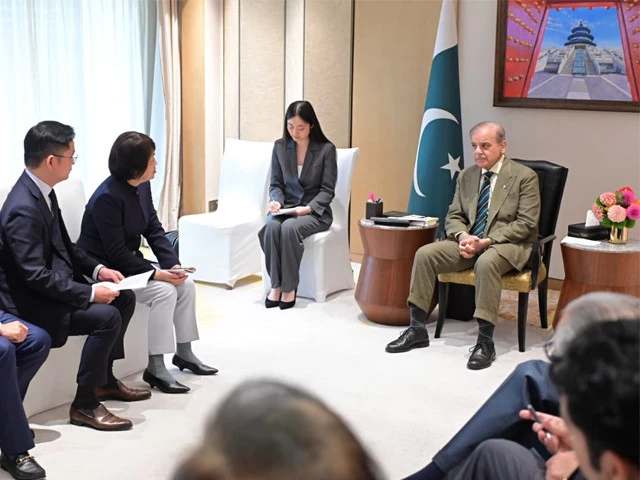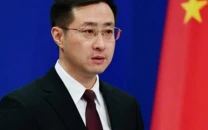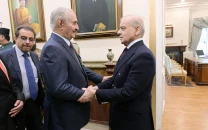PM Shehbaz invites Chinese businesses to invest in Pakistan
Premier says Pakistan offers conducive investment environment, strategic connectivity with regional and global markets

Prime Minister Shehbaz Sharif on Wednesday held a meeting with the senior executives of prominent Chinese enterprises in Beijing. He invited Chinese businesses to invest in Pakistan and set up industries in Pakistan’s Special Economic Zones (SEZs).
According to a statement from the Prime Minister’s Office, talks focused on boosting business-to-business cooperation in various key sectors including textiles, information technology, agriculture, mining and minerals, road and digital connectivity, e-commerce and space technologies.
Shehbaz highlighted reforms introduced by his government, citing tax incentives for investors, relaxed visa policies for Chinese nationals and dedicated airport booths to facilitate business travel.
Business Executives of Chinese companies from textiles, IT, Agriculture, Industry, Mines and Minerals, Roads and Digital Connectivity, E-commerce and Space Technologies sectors called on Prime Minister Muhammad Shehbaz Sharif in Beijing.#PMShehbazDiplomacy@ForeignOfficePk |… pic.twitter.com/KUpli4LTD8
— Government of Pakistan (@GovtofPakistan) September 3, 2025
He underscored the role of the Special Investment Facilitation Council (SIFC) as a platform to accelerate investment, remove obstacles and strengthen business-to-business ties.
“Industrial cooperation is the cornerstone of Pakistan-China economic ties and a pillar of the high-quality development of CPEC’s second phase,” Shehbaz said.
The prime minister informed the Chineese business executives that Pakistan offers a unique advantage of skilled and low-cost labour, affordable raw materials for industrial output, and strategic connectivity with regional and global markets.
وزیراعظم کی چین اور پاکستان کے درمیان B2B سرمایہ کاری کو فروغ دینے کے لیے اعلیٰ چینی کاروباری شخصیات سے ملاقات
— PTV News (@PTVNewsOfficial) September 3, 2025
تیان جن میں شنگھائی تعاون تنظیم کے سربراہی اجلاس میں شرکت کے بعد، چین کے سرکاری دورہ کے موقع پر، وزیر اعظم محمد شہباز شریف نے بیجنگ میں چین کے سرکردہ کاروباری… pic.twitter.com/MbQDbo6KUH
Shehbaz assured Chinese businesses of a supportive investment climate. He stressed that increased investment in SEZs would reinforce the vision of CPEC as a driver of regional development, innovation and shared prosperity.
PM Shehbaz reached Tianjin on Saturday to attend the SCO Council of Heads of State (CHS) summit, which held from August 31 to September 1.
Shehbaz Sharif underscored the Indus Waters Treaty (IWT) issue at the Shanghai Cooperation Organisation's (SCO) summit in China and called for "dialogue, diplomacy and consultation" instead of confrontation on all outstanding disputes.
Apart from Pakistan, the SCO comprises of China, India, Russia, Iran, Kyrgyzstan, Tajikistan, Kazakhstan, Uzbekistan and Belarus. Another 16 countries are affiliated with the organisation as observers or "dialogue partners".
“We respect all international and bilateral treaties and expect similar principles to be followed by all SCO members,” said Shehbaz as the summit concluded, referring to India's unilateral move to the hold the IWT in abeyance in April.
Read: Xi proposes Global Governance Initiative as SCO summit kicks off
“Uninterrupted access to due share of water as per existing treaties among SCO members will strengthen the SCO and will support the achievement of broader goals for which the SCO was established,” he underscored. “We seek normal and stable relations with all our neighbours, guided by dialogue and diplomacy, consultation over confrontation.”
Prime Minister also met Chinese President Xi Jinping at the Great Hall of the People in Beijing, where they reaffirmed their commitment to the China-Pakistan Economic Corridor (CPEC) and agreed to advance its next phase through five new corridors to expand cooperation in key economic sectors.
The two leaders emphasized that the Pakistan-China partnership was unique and unparalleled and agreed that this bond should be reflected through enhanced cooperation across multiple fields.
Prime Minister Shehbaz reaffirmed the desire to continue working closely with China for the successful implementation of the next phase of upgraded CPEC, terming the project a flagship of President Xi’s Belt and Road Initiative (BRI).
Shehbaz appreciated China’s unflinching support to Pakistan’s territorial integrity, sovereignty, and socio-economic development and said CPEC would help both nations build an even stronger Pakistan-China community with a shared future.
On the sidelines of the summit, PM Shehbaz also met Russian President Vladimir Putin. The two leaders pledged to strengthen bilateral relations in trade, energy and regional connectivity.
Shehbaz praised Putin’s role in fostering closer relations, saying, “Relations between the two countries have improved during the past years on the basis of mutual interests.”
The prime minister specifically mentioned that following their previous meeting at the Shanghai Cooperation Organisation (SCO) summit, both sides agreed to enhance delegations’ visits. The two countries also signed new protocols in key sectors including agriculture, iron, steel, energy and transport.”
Shehbaz highlighted the significance of a proposed trade corridor linking Belarus, Russia, Kazakhstan, Uzbekistan, Afghanistan and Pakistan, saying it would boost regional prosperity. He added, “Pakistan respects Russian Federation’s ties with India but we also want to build very strong relations.”
“Together, both countries would make further efforts to promote the bilateral ties and cooperation particularly in commerce and trade,” he said.
Also Read: Pakistan, China to advance next phase of CPEC with five corridors
Putin said Moscow valued its longstanding partnership with Islamabad. “Pakistan has always been our traditional partner in Asia and we cherish these ties,” he said.
The Russian president also extended condolences over lives lost in recent natural disasters in Pakistan, expressing optimism that the country would overcome challenges.
Putin invited Shehbaz to attend the SCO heads summit in Russia this November, to which the prime minister responded saying, “He is looking forward to the visit.”





















COMMENTS
Comments are moderated and generally will be posted if they are on-topic and not abusive.
For more information, please see our Comments FAQ